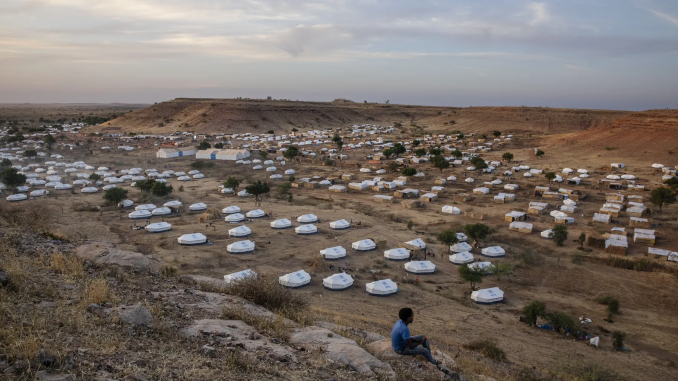
There is a famine in northern Ethiopia. In the Tigray, Afar and Amhara regions, over 5 million people are suffering from acute food shortages and over 3 million lack access to safe drinking water. The famine is a direct consequence of the Tigray war, which started in November 2020.
The mainstream account we always hear about Africa is one of frequent famine and war, as if the entire continent is unable to feed itself or avoid tribal conflict. In other words, the poverty of Africans is blamed on Africans. The truth is that Africa has been subjected to centuries of violent colonialism and genocide by the capitalist powers in Europe and the United States. The poverty and war in Ethiopia are no exception: they are not caused by some problem inherent to Ethiopia, but violently imposed on it by capitalism.
Ethiopia is sometimes considered one of the only two African countries that were never colonized by European powers (the other being Liberia). The reality is a bit more complex. Ethiopia was ruled by indigenous emperors until the late 19th Century, when Italy’s rulers tried to invade and colonize the country. Italy succeeded in subjugating what is now Eritrea, but failed to take Ethiopia. In 1935, fascist dictator Mussolini decided to give this a another try and invaded Ethiopia. The Italian army massacred tens of thousands of Ethiopians in 1937, used chemical weapons and bombed the country extensively. The occupation was short-lived, however, since Italy came out on the losing side of the Second World War. The British army drove the Italians out in 1941 and the Ethiopian Emperor Selassie returned to his throne.
Britain and France had colonial control over much of Africa since the late 19th Century, exploiting workers and pillaging natural resources. But the Second World War weakened these capitalist powers and lifted the United States instead. The U.S. capitalists began to take over many of the countries previously dominated by Britain and France. In Ethiopia, they found an ally in Emperor Selassie, training his army and helping him annex Eritrea. Selassie brutally suppressed the Eritrean working class by outlawing unions and shooting people who protested for Eritrean independence. This triggered the lengthy Eritrean War of Independence (1961-1991), in which the Ethiopian army tried to put down the guerilla fighters of the Eritrean independence movement.
In 1973, the world experienced an oil crisis triggered by an embargo set by the major oil exporters Saudi Arabia, Kuwait, and Libya. Their embargo was targeted against the U.S., Canada, and other states that supported Israel in its 1973 “Yom Kippur” war. Oil prices shot up around the world. As a result, strikes erupted in Ethiopia, leading to Emperor Selassie being overthrown in a 1974 military coup.
The new Derg regime formed an alliance with the Soviet Union. It continued the war against the Eritreans who were seeking independence, as well as against opposition groups in Ethiopia, such as the Tigray People’s Liberation Front (TPLF). But now this became a proxy war between the two superpowers, with the U.S. supporting Eritrea and the Soviet Union supporting Ethiopia. In 1983-1985, Ethiopia suffered a horrible famine as a result of the Derg repressions, especially in the Tigray region, where the Derg rulers restricted the food supply to weaken the guerilla fighters of the TPLF. The Ethiopian and Eritrean people were added to the long list of victims of the Cold War.
After the collapse of the Soviet Union in 1991, the TPLF formed a new government. Eritrea gained independence from Ethiopia in 1993, but the hostility between the two countries had not disappeared, and they went to war once again in 1998-2000. Under the TPLF government, inequality increased rapidly. Protests against the government in 2015 escalated until the TPLF was removed from power in the 2018 elections.
The new government under Prime Minister Abiy Ahmed aimed to unify the country and encourage capital investment from China and the United States. He was awarded the Nobel Peace Prize in 2019 for signing a peace treaty with Eritrea. Like other Nobel Peace Prize winners, however, Abiy would soon prove that he does not shy away from war. The ethnic divisions exacerbated by decades of war are very difficult to heal, as different groups seek self-determination, coming into conflict with Abiy’s national unification project. The Tigrayans, for example, are a minority (about 5% of Ethiopia’s population of 117 million), but the TPLF has exercised power in the country for almost two decades and is opposed to any weakening of its power in the Tigray region. Strong opposition to Abiy’s unification also comes from people in the south, such as the Oromo (Abiy’s own ethnic group). Many of the activists from the Oromo pro-democracy movement that propelled Abiy into power now criticize him for behaving like a dictator and betraying his democratic promise, as Abiy attacked protesters and deposed the regional president of Oromia.
In 2020, the TPLF carried out separate elections in the Tigray region – in defiance of Abiy’s federal government. This triggered the Tigray War in November 2020 between the Ethiopian military and Tigray armed forces allied with the TPLF. As the fighting escalated in 2021, food supplies to the Tigray region were blocked by the Ethiopian military, leading to the ongoing famine. As in many other countries in Africa, the humanitarian disaster in Ethiopia is the legacy of over a century of conflicts between ruling classes over the resources and labor of the African people. This creates bitter divisions between groups of workers and farmers who are sent to kill each other on behalf of the rich and powerful.
Although the immediate cause of these conflicts appears to be internal divisions in the country, it is important to remember that these are not a result of a “tribal mentality” inherent to the region, as often described by racist imperialist powers. They are a result of colonialism and capitalism.

